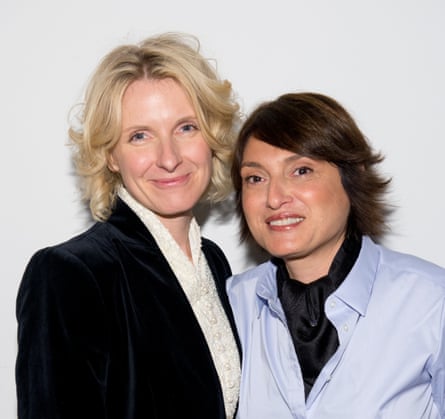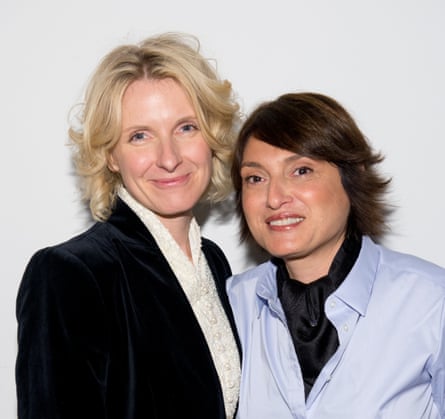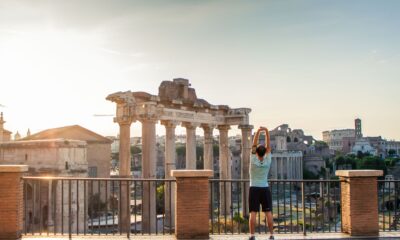Opinion
Elizabeth Gilbert’s memoir has raised eyebrows – but she always comes out on top | Emma Brockes

Read more on post.
If you are someone who reads multiple news sources a day, a fun way to occasionally spend your time over the last few weeks would have been to watch how critics and commentators have grappled with a hard problem. It is not, admittedly, as hard as the problem of grappling with consciousness. But it is hard enough that the famous assurance by Glennon Doyle, lifestyle coach and thought leader, that “we can do hard things,” remains relevant. I am talking about the problem of how we talk about All the Way to the River, Elizabeth Gilbert’s new memoir – specifically, how to be kinder and more measured about it than the book really deserves.
As you may know if you are one of the 30 million people who bought Eat Pray Love, one of the tens of millions who have read Big Magic or one of her other novels, or simply one of her 1.2 million followers on Instagram, Gilbert recently published a memoir that tells the story of the final years of Rayya Elias, a 57-year-old hair stylist who died of cancer in 2018. This was the woman for whom Gilbert left her husband – the one she met in Bali at the end of the first memoir – and with whom she descended into a drug-addled nightmare after Elias’s diagnosis. It is a horrific tale, one in which Gilbert watches, sometimes helpless, sometimes enabling, as Elias spirals into paranoia and addiction and drags the boundary-less Gilbert down with her. It is also an awesomely, breathtakingly, jaw-droppingly bad book.
Even the most successful authors can misfire, and All the Way to the River would be unremarkable if it weren’t for the fact that, to date, Gilbert’s instincts have always been so on the money. In terms of writing, she is vastly more talented than most operators in the female-empowerment space – the ones who tell us to be vulnerable, and the ones who advise us that the main thing is to have “grit” and the ones who assure us we can do hard things. Gilbert has never quite fitted into this crowd, partly because she has a writing career beyond grifty self-help, and partly because she has always seemed to me to be a much harder-nosed and more interesting figure than those gals.
Big Magic, which counselled readers on how to have a creative life (and, by implication, how to become Liz Gilbert), is a perfectly wise book. Eat Pray Love is a pitch-perfect romcom. And while stylistically Gilbert can be as winsome as the next woman selling self-love, I’ve always been interested in the fact that she is about the only superstar creator of female inspo-content who doesn’t have children – not only that, but is matter-of-fact about never having wanted them. You have to tip your hat to Liz Gilbert, the woman is an absolute tank.

I mention all this because All the Way to the River, which opens with a long, imagined address to Gilbert by the late Elias and includes a claim by Gilbert that she is channelling the spirit of Elias’s dead mother (“my soul left my body so Georgette could be alone with her girl”), has proved hard to review, mainly, I suspect, because the author has so much goodwill in the bank. The phrase “raw honesty” gets a lot of outings, as does “bravery”, the word you use for a book you hated but is about painful things you feel guilty about trashing. This newspaper called the memoir a “solipsistic mess”, but also, “moving”, while the New York Times called it “excruciating”, then quickly stood down and settled on the quieter critique, “earnest, vulnerable but ultimately quite corny”.
For the author herself, the issue might have been one of what happens when you are your own source of material and that material starts to run thin. In the past, Gilbert has been quite honest about how calculating she is in her search for material. In her 20s, for example, she got a job at the grunge bar Coyote Ugly in downtown New York precisely so she could write about it. (The experience became a long magazine piece in GQ, then a movie.) There’s nothing wrong with that, it’s what hacks do and she is better at it than anyone.
This time, Gilbert seems to have gone a step further. When she met Rayya, Gilbert describes herself in the book as looking like a “sales clerk at Banana Republic”. Seven years after Rayya’s death and the author is pictured everywhere in a sleeveless jumpsuit, hair shaven, skin pierced and tattooed, a style she admits she picked up from her late girlfriend and that makes her many degrees better dressed than she used to be. But to this lesbian’s eyes it’s an odd piece of appropriation that on a latterly straight woman with a wardrobe from Banana Republic looks like someone who has shown up to Halloween in a lesbian costume.
The tribute is, I’m sure, lovingly intended, but from the outside it looks like cosplay and seems to me at odds with Gilbert’s steely persona. On the other hand, the book went straight in at number two on the New York Times chart this month, so – and I mean this – not only good luck to her, but perhaps as usual, she knows precisely what she is doing.
after newsletter promotion
-
Emma Brockes is a Guardian columnist
-
Do you have an opinion on the issues raised in this article? If you would like to submit a response of up to 300 words by email to be considered for publication in our letters section, please click here.
Opinion
Letter: John Stapleton obituary
Read more on post.

John Stapleton was a fearless reporter as well as a silver-tongued studio presenter. We worked together in the mid-1980s on three full-length documentaries for BBC Two.
Two of them concerned Paul Cleeland, one of the UK’s then longest serving prisoners. He maintained that his conviction for a murder committed in 1972 was a miscarriage of justice.
The third, The Perfect Diet?, was an investigation into controversial very low calorie diets – VLCDs – that ended in a high court battle to beat off an injunction. We interviewed the inventor of one of the diets, and John agreed to take a softy softly approach at the start of the interview. The camera rolled, and John asked his first question: “Now tell me, is it true your diet is killing some people?”
Opinion
Trump’s Effort to Pick America’s Corporate Winners Will End Badly

Read more on post.
SEOUL – For at least the last 150 years, state intervention in picking individual industries and firms to support has been shown to undermine productivity and weaken economic performance. When political considerations outweigh sound commercial judgment, companies may be compelled to keep unprofitable factories open, maintain loss-making activities, favor government-owned suppliers over private vendors, or appoint unqualified but politically connected individuals to leadership positions.
Opinion
I was elected mayor of Istanbul, but I write this from jail: Turkish democracy is under grave threat | Ekrem Imamoğlu
Read more on post.

Last year, I was reelected mayor of Istanbul with 51% of the vote. It was the second time I had defeated the government-backed candidate. The first was in 2019 when the mayoral elections were annulled on flimsy pretexts; voters returned to the polls and handed us a victory by an even larger margin.
But this year, democracy in Turkey has entered its most perilous phase. The process started in March on the eve of my nomination as the presidential candidate of the CHP, the century-old Republican People’s party. This was when my university degree was abruptly annulled. Why is this relevant? Because, under the Turkish constitution, one must have a university degree to be able to run for president. Soon after, I was accused of corruption and “aiding a terrorist organisation”. For six months, I have been behind bars, arrested on politically motivated corruption charges based on “anonymous” witnesses. In a country bound by the European convention on human rights, this is an outrage.
Nor am I alone. Across Turkey, more than a dozen mayors from the opposition are now imprisoned. Sadly, the numbers are rising all the time; more than a quarter of Istanbul’s districts have had their elected leaders arrested, silencing millions of voters in one of the world’s great cities.
From mayors in Adana and Antalya, to municipal staff in Istanbul, repression has reached every level. Hundreds of people languish in prison, including journalists, academics, businesspeople and students.Enes Hocaoğulları, a youth delegate to the Council of Europe, was detained for merely speaking out under Turkey’s vaguely worded laws on “misleading” the public. This shows how far the crackdown has gone. His release, after protests at home and abroad, is a small but telling victory for democratic resistance.
Let me be clear about what is happening. In the arrogance of unchecked power, President Recep Tayyip Erdoğan is once more weaponising the courts against the democratic opposition. This time, opponents are being imprisoned and replaced with loyalists. Unable to shut down the CHP, the government is pursuing a case that will have the effect of erasing the CHP’s rising leadership by overturning the outcome of its 2023 national party congress. Earlier this month, a court moved to annul the CHP’s local congress in Istanbul, remove its chair and install a trustee.
The case against the CHP, which the government keeps dragging out in hopes of destabilising the main opposition and removing its legitimate leadership, marks a turning point in the effective dismantling of political pluralism. A system where judges replace elected leaders with handpicked stand-ins is no democracy at all.
Having hollowed out the republic’s institutions to build an authoritarian regime, Erdoğan now seeks to fabricate a compliant, hollow opposition. He intends to rewrite the rules so no genuine rival could survive, securing power in the style of Egypt’s Hosni Mubarak or Syria’s Assads. These are deliberate methods likely to be copied elsewhere tomorrow unless democrats everywhere stand together to resist them.
Erdoğan’s increasingly repressive tactics expose his eroding popular support and his desperate bid to preserve power. To avoid another defeat in the ballot box, he rewrites the rules. He relies on smear campaigns, corruption charges, efforts to divide the opposition and the ever-present “terrorist” label. Yet, this display of power has further undermined his legitimacy, leaving him increasingly dependent on a narrow minority and the machinery of the state.
The people of Turkey are no longer deceived. Protests fill the streets, and polls consistently place CHP as the country’s leading party. Since 19 March, the day I was detained and jailed, millions of citizens, even in Erdoğan’s supposed strongholds, have been participating in peaceful protests to demand justice and change, despite the risk of arrest and police violence. This resistance reflects Turkey’s 150-year tradition of parliamentary democracy. But resistance alone is not enough.
That is why the CHP is preparing a comprehensive roadmap for democratic transition, to build a resilient and inclusive alliance: win elections; stabilise the economy; restore judicial independence; combat corruption and organised crime; expand social rights; rebuild trust in institutions; and redefine Turkey’s role in a changing geopolitical landscape.
Turkey’s fight for democracy, freedom and justice is not Turkey’s alone. If a nation whose experience proves that democracy is a universal project slides deeper into autocracy, the consequences will reverberate far beyond its borders.
Yet I remain convinced: the will of the people will prevail. Our outrage in the face of injustices must be turned into a strategy. That strategy must involve building a new political culture and institutions that honour Turkey’s democratic legacy. If we achieve that, we will not only reclaim our democracy at home but help it rise again across the world.
-
Ekrem Imamoğlu is the elected mayor of Istanbul and the presidential candidate for Turkey’s main opposition Republican People’s Party (CHP)
-
Breaking News1 day ago
Barack Obama to be conferred with freedom of Dublin at ceremony on Thursday
-
Culture1 day ago
Taylor Swift’s new cinema outing generates more than €12million in just 24 hours
-
Breaking News1 day ago
Opinion: To be or not to be? Why it is time to drop Shakespeare’s compulsory status in Leaving Cert
-
Breaking News1 day ago
Minister rejects proposal to make Shakespeare optional in Leaving Cert English
-
Breaking News1 day ago
Families at risk of homelessness may have another chance to avail of tenant-in-situ scheme
-
Politics1 day ago
European Parliament snubs Orbán with vote to shield Italian MEP from Hungarian arrest
-
Culture1 day ago
Milan Fashion Week 2025: Unmissable shows and Giorgio Armani in mind
-
Travel & Lifestyle2 days ago
The Best Way to See Rome? On a Running Tour at Sunrise
















































